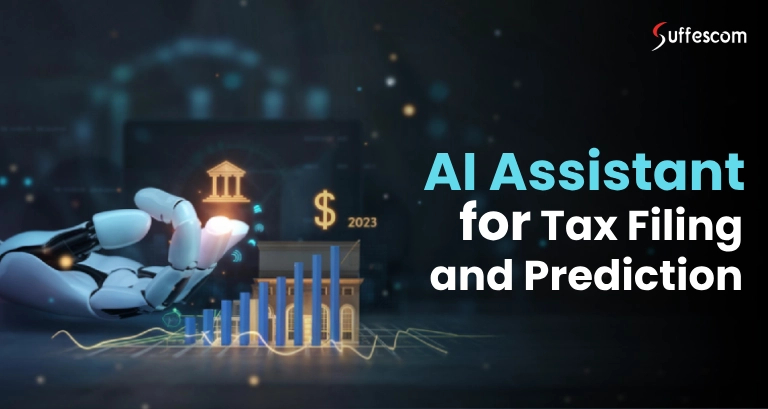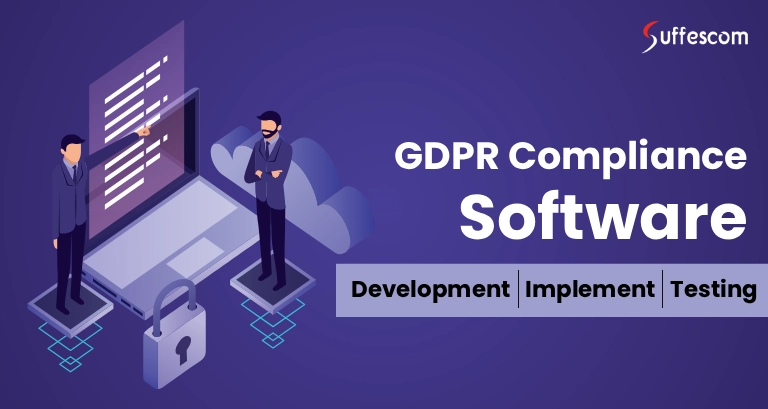AI Tax Filing Software Development: Build Smarter Tax Filing Apps

Tax season is stressful. Deadlines pile up, rules keep changing, and the margin for error is razor-thin. That’s exactly where AI tax preparation software comes in. Instead of endless paperwork and guesswork, an AI-powered tax app works like an AI tax return assistant predicting refunds, automating compliance, and reducing mistakes that cost money.
The global market for generative AI in corporate tax management was valued at $1.3 billion in 2023, projected to reach $13.6 billion by 2033 with a CAGR of 26.5%. AI assistants for tax filing are a major player in this development.
If you’ve ever wondered what it takes to build AI tax filing software, this guide breaks it down. You’ll learn the key features, development process, costs, revenue models, and why partnering with experts like Suffescom Solutions makes all the difference. Many startups are now combining DIY tax preparation software with AI-driven tools to deliver smarter, faster, and more accurate filing experiences.
Why AI Tax Filing Software Matters in 2025
Filing taxes isn’t just about filling forms anymore. It’s about compliance, speed, accuracy, and planning. Traditional software helps, but it’s limited. AI brings in automation, predictive analytics, and real-time compliance monitoring.
What this really means is: businesses avoid penalties, individuals maximize deductions, and tax consultants can scale their services faster. This evolution also bridges the gap between DIY tax preparation software and professional-grade AI assistants, giving users more control and confidence over their tax filings.
Key Features of AI Tax Filing Assistant Software
When developing an AI tax filing app, these features matter most:
1. Automated Data Collection and Entry
Our software automatically extracts data from receipts, bank statements, invoices, payroll, and other financial documents. It helps save time by eliminating manual entries. With smart categorization, our AI app for personal tax prediction categorizes data into income, expenses, and deductions.
Additionally, the chances of inaccurate data decrease, as automated operations are less likely to create errors in data collection and entry. You get relevant and comprehensive financial information.
2. Tax Form Preparation and E-Filing
Reduce the risk of omission and misfiling with guided tax form selection and completion based on the user profile. Also, get direct e-filing capabilities with tax authorities for seamless and quick submissions.
Keeping user convenience in consideration, our AI-powered e-filing companion automatically pre-populates forms to minimize manual input and errors.
3. Deduction and Credit Discovery
An assistant uses AI to scan for users' eligible credits and deductions to maximize refunds. An assistant with AI for tax refund tracking plays a crucial role in providing users with essential taxation-related information. Using this provision, users can understand how their choices affect overall liability.
4. Real-Time Q&A
Improve accessibility with a conversational AI interface for instant answers to tax-related questions. Offer personalized guidance to the users for complex concepts, along with instant assistance to reduce the time invested in finding answers.
5. Audit Risk and Compliance Monitoring
Who doesn't want to avoid costly mistakes? Our AI assistants identify potential audit inefficiencies in real-time before submission. Avoid penalties and ensure that users stay compliant with all deadlines and requirements.
Keep a check on compliance with the latest tax regulations and deadlines across multiple jurisdictions. Such features boost users' confidence in filing taxes because the assistant is actively managing everything.
6. Predictive Analytics
Our AI tax filing software development process enables our assistants to forecast different tax outcomes before committing to financial decisions. This helps the users to make decisions based on factually accurate information.
With predictive analytics for tax planning, businesses and individuals can better prepare for future tax liabilities. Additionally, the inclusion of what-if scenario modeling facilitates more effective financial planning. Additionally, our assistants help with optimizing strategy; testing the impact of deductions, or new business activities on taxes.
7. Multi-Tax Type Support
With an immense focus on global compliance, our AI assistant seamlessly handles taxes for multiple states, countries, or regions. Along with easy management, a unified multi-tax support streamlines taxation complexities for users in various locations.
It is a great selling feature, as it helps expand the user base by supporting a variety of business models, including international and multi-state companies.
8. Automated Registration and Threshold Monitoring
Our assistance solutions help prevent regulatory oversights by notifying users when sales or operations trigger new tax obligations. Initiate necessary registrations automatically to reduce manual workload.
Our AI assistants ensure continuous compliance by preventing accidental tax evasion through missed registrations.
9. Integration with Financial and Accounting Tools
Get AI tools that easily integrate with financial and accounting tools such as ERP, payroll, bookkeeping, CRM, and payment platforms for higher interoperability. The assistant minimizes data redundancy by utilizing auto-synchronization with bookkeeping, payroll, and payment systems.
Eliminates double data entry, reduces discrepancies, enables real-time data filling and analysis.
10. Document Review and Management
Our AI assistants for tax filing automatically review uploaded documents for missing, inconsistent, or erroneous entries. Simultaneously, it suggests corrections to improve accuracy before final submission.
Automatic review and error detection reduce rejections, ensure data quality, and overall accuracy.
11. User Role and Access Management
Our AI assistants limit access to sensitive data based on individual roles and responsibilities, thereby enhancing security. Along with security improvement, the assistants enable teamwork among accountants, advisors, or multiple business units.
12. Security and Data Privacy
Protects sensitive information by encrypting financial data to reduce the risk of breaches. Build higher user trust by complying with data protection regulations and laws, such as GDPR or CCPA.
13. Continuous Tax Law Updates
Our AI assistants are always up-to-date with changing tax codes, deadlines, thresholds, and regulations. Users always benefit from the latest tax codes and regulation changes. Additionally, it reduces research time spent tracking new taxation rules and avoids penalties resulting from outdated or incorrect information.
Discover the Power of Our AI Assistant for Tax Filing
Experience effortless tax management, real-time insights, and faster returns with our AI-powered assistant built for accuracy.
Development Process for AI Tax Filing Software
Creating a reliable AI assistant for tax return prediction and filing starts with a clear understanding of user needs.
1. Understanding Client Requirements
At Suffescom Solutions, we begin by collaborating with clients to understand their specific challenges, be it filing speed, accuracy, compliance, or multi-user support. This initiative ensures that the final product fits real-world tax scenarios for individuals, businesses, and consultants.
2. Development Planning
Next comes careful planning. Choosing the right AI models, datasets, and features is vital. For example, integrating real-time tax code updates, predictive filing estimates, and deduction suggestions makes the AI truly useful. We follow Agile strategies to stay flexible and efficient.
3. Data Collection
We source and cleanse vast tax-related datasets while ensuring legal compliance. This builds the foundation for intelligent insights. Using inaccurate or biased data can lead to flawed predictions, which in turn can harm user trust and financial outcomes. Hence, we only use verified sources and continuously update the data.
4. Designing and Development
During development, we build intuitive interfaces that users can easily navigate. An AI tax planning assistant development project must prioritize user-friendliness, whether it’s a small business owner or a tax professional using it. Complex dashboards or unstructured features can discourage adoption.
5. Testing and Quality Assurance
Testing is not an afterthought; it's continuous. We test the assistant in real-life tax filing scenarios, including peak seasons, changing tax rules, and diverse filing types. Without rigorous testing, AI features can malfunction, leading to filing errors or compliance penalties.
6. Constant support
During and after launch, ongoing support and updates are critical. Tax rules change frequently, and so should your AI tool. That's why Suffescom offers continuous improvements and support services. Clients who skip this step often face outdated tools and increased user drop-offs.
How Much Does Our AI Tax Filing Software Development Cost?
On average, building an AI tax return software costs between $10,000–$30,000. Final pricing depends on complexity, features, and integrations.
This cost range includes every development component, from designing, development, and testing to market launch! Following is the complete list of such components;
1. Licensing/Subscription: Recurring or per-use software fees
2. Setup & Customization: One-time onboarding, branding, workflow configuration
3. Integration: Connecting to accounting and financial tools, API costs
4. Data & AI Development: Preparing, training, and maintaining AI models
5. Maintenance & Updates: Ongoing functional, regulatory, and performance improvements
6. Security & Compliance: Encryption, privacy, and legal adherence expenses
7. Support & Training: User assistance and onboarding
8. Infrastructure: Cloud, server, storage, and bandwidth costs
9. Marketing: User acquisition and product promotion
10. Audit Readiness: Documentation and compliance for audits
USPs of Our AI Tax Planning Assistant Development
Here's how we justify the cost of our AI assistant for tax return prediction;
1. Latest AI technology stack (advanced LLMs, agent-based frameworks)
2. Edge AI and real-time data processing capability
3. Cloud-native architecture (scalable, cost-effective, secure)
4. Modular and microservices-based system design
5. Use of MLOps and AutoML tools for streamlined model deployment and retraining
6. CI/CD pipelines
7. Agile and Scrum methodologies
8. Cross-functional, collaborative development teams
9. Automated testing
10. Advanced data engineering practices
12. Built-in data security and compliance mechanisms
13. Iterative, feedback-driven model improvement
14. Scalability and multi-tenant support for SaaS deployment
15. Rapid prototyping and experimentation cycles
16. Comprehensive documentation and developer support tools
Monetization Models To Generate Significant Returns for AI Tax Filing Apps
Developing an AI assistant for tax filing isn't just about simplifying taxes. It also opens the door to multiple revenue streams. Below are the top monetization models that can help businesses earn significant returns.
1. Subscription-Based Model
Users pay a monthly or yearly fee to access the AI assistant's features. Plans can be tiered; basic for individual taxpayers and advanced for accountants or businesses. The subscription model helps predict revenue and customer retention, and facilitates easy scalability.
To start with, offer free trials with limited access, then prompt users to subscribe to full features.
2. Freemium Model
This model offers a free version with essential features, while locking advanced tools behind a paywall. For example, basic tax calculations can be free, but AI for tax prediction and compliance tracking can be premium.
The freemium model attracts more users and converts a portion of free users into paid users over time.
3. Pay-Per-Use Model
Under this model, users pay only for the features they use, such as filing state returns or accessing audit risk reports. Ideal for occasional users. This model features highly transparent pricing, which ultimately enhances user trust.
Add pricing to specific actions, like generating detailed reports or exporting financial summaries.
4. Partner Integration and API Access
Allow third-party apps like accounting tools or payroll platforms to integrate via API and charge them for access. It expands user reach with minimum effort. How to incorporate this model? Start with offering secure API documentation and tiered access based on request volume.
5. White Label Licensing
License the AI-based tax assistant software to other firms that want to rebrand and offer it as their product. Achieve a higher return with minimal ongoing costs by building a customizable backend and offering flexible branding options.
6. Affiliate Marketing and Partnerships
Promote relevant financial services like insurance or investment tools, etc., and earn commissions. Though it is not a constant revenue channel, it surely provides additional income without extra development.
7. Corporate Licensing
Sell packages to tax consultancy firms or corporate tax departments with team-wide access.
Attract high-ticket clients and secure long-term contracts for a consistent and reliable source of income. Offer bulk user management, team dashboards, and dedicated support to get started.
Boost Efficiency with AI Tax Filing Software Development
Simplify your tax season with intelligent automation, faster filing, and proactive support tailored to your financial goals.
Why Choose Suffescom Solutions for AI Tax Software Development?
What sets Suffescom apart is our client-first approach. We blend deep tax domain knowledge with AI expertise. We involve stakeholders throughout the journey to ensure the product meets both business goals and end-user expectations.
Our Key Strengths
- A proven expert, a leader in AI development services, offering customized solutions.
- Deep experience with financial & software systems.
- Diverse portfolio, strong reputation & global reach.
- Client-centric and results-driven approach.
- Agile and adaptive frameworks.
- High ratings on Clutch (4.8/5), Upwork (4.9/5 with 94% job success), and GoodFirms (4.9/5).
- Diverse industry expertise serving clients across healthcare, finance, retail, and e-commerce.
- Focus on advanced technologies like AI, blockchain, and IoT.
- Strong client relationships.
Whether you're seeking an assistant for tax filing with AI automation or a full-stack tax intelligence solution, we focus on results that drive accuracy, speed, and the best AI for automated tax compliance.
Ending Note!
It is time to delegate tasks to an AI assistant for tax filing and return prediction, achieving maximum operational efficiency. Suffescom is here to deliver the best solution featuring automated data collection and entry, tax form preparation and e-filing, real-time Q&A, audit risk assessment, predictive analytics, multi-tax type support, tools integration, and access management.
By following the right development journey, your AI product won’t just work it’ll lead. Trust Suffescom Solutions to turn your AI tax idea into a powerful, scalable assistant ready for the real world.
FAQs
1. What is an AI assistant for tax filing?
An AI assistant for tax filing and return prediction helps the user by managing taxation-related operations, such as filing tax returns. Such a tax AI assistant utilizes artificial intelligence to manage these functions.
2. Can AI help me file my taxes?
Yes, AI can help with filing taxes and predicting returns. Considering the advancements in artificial intelligence, the technology has begun to play a significant role in the financial landscape as well.
3. What is the process of AI tax filing software development?
The process of developing the best assistant with AI for tax prediction starts with understanding client requirements, planning, data collection, designing and development, testing, and ends at market launch.
4. What are the features of an AI assistant for tax return prediction and filing?
The best AI assistant for tax professionals must feature automated data collection and entry, tax form preparation and e-filing, audit risk assessment, predictive analytics, multi-tax type support, financial tool integration, and user profile & access management.
5. What is the cost of an AI tax assistance system development?
The AI development cost to develop an AI assistant for tax return prediction and filing ranges between $10,000 and $30,000, encompassing all development components.
6. How accurate is AI in tax filing compared to traditional software?
AI assistants reduce manual errors, auto-update tax codes, and predict outcomes, making them more accurate than traditional tools.
7. Can AI handle multi-state or international compliance?
Yes. AI tax filing apps can manage multiple jurisdictions with real-time compliance updates.
8. How secure is AI-powered tax software?
It uses encryption, secure APIs, and complies with GDPR/CCPA to protect sensitive financial data.







